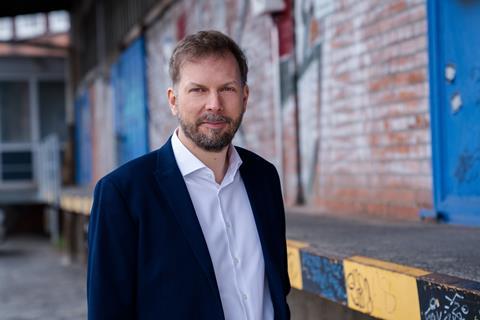
Hamburg and Schleswig-Holstein’s regional film fund MOIN will have a strong presence at this year’s Filmfest Hamburg.
17 films funded by MOIN will screen at the festival, including international productions such as Nicolaj Arcel’s King’s Land and Alice Troughton’s The Lesson as well as Isabal Herguera’s animated feature Sultana’s Dream and Leiv Igor Devold’s Norwegian Dream.
Other MOIN backed features include new works by German filmmakers ranging from Sven Halfar (Heaven Can Wait - Wir Leben Jetzt) through to Stephan Rick (The Roots Of Evil) and Katharina Lüdin (Of Living Without Illusion).
“It says something about the reliability of our committees’ taste in film and shows that they are really capable of finding the right projects and then giving them support,” says MOIN’s CEO Helge Albers, a former producer who has headed up the fund since April 2019.
“It’s also a testament to the broad spectrum of films supported by MOIN whether it’s feature films, documentaries, series or animation, and of course, we are pleased that the people of Hamburg can then see these films, which were made in Hamburg or as co-productions with local companies, when they are then programmed at the Filmfest.” Albers says.
Funding focus
MOIN has an annual budget of around €15m and supports cinema films, high-end series and innovative audiovisual formats. The goal is to develop the region’s audiovisual industries and welcome filmmakers from all over the globe to film in the region. MOIN is also the parent company of Filmfest Hamburg and naturally has a close relationship with the festival.
The fund has been involved in several promising film and TV projects which have come to shoot in the region over the past 12 months.
They include the historical espionage series Davos, which has its world premiere at the Zurich Film Festival on 6 October, and UFA Fiction’s dystopian high-end series Helgoland 513, with Robert Schwentke as director, showrunner and headwriter. Wüste Film’s co-production with Studiocanal and Gretchen Film of an adaptation of Carsten Henn’s international feelgood bestseller The Door-to-Door Bookstore has also filmed in the region.
Moreover, shooting continues at locations in Hamburg until the end of October on Studio Zentral and Jünglinge Film’s eight-part dramedy series Schwarze Früchte, devised by actor Lamin Leroy Gibba to offer a self-confident and idiosyncratic look at the lives of black and queer people in today’s Germany.
Diversity push
As well as its core funding activities, MOIN has been developing other projects to boost the local filmmaking industry.
This includes the OMNI Inclusion platform, an anonymised online measurement tool to better understand the diversity of the cinema and TV industry in Germany. An initial prototype has already been developed and an industry-wide advisory board established to help guide OMNI into the pilot phase. The first comprehensive OMNI Inclusion Report is expected to be published in 2024.
“It will mean that the whole of the German film and TV industry is soon in a position to say how diverse and inclusive our structures are,” Albers suggests.
MOIN now has one dedicated member of staff who is specifically charged with monitoring diversity and inclusion. It is the only film funding institution in Germany to have such a position.
More information about the OMNI Inclusion initiative will unveiled during the Filmfest’s Explorer conference on October 6, and Albers hopes to have a more detailed report about the initiative ready at the beginning of 2024.
Taking a green lead
Environmental sustainability is also a key priority for MOIN. In July, the uniform ecological production standards developed by the Federal Government Commissioner for Culture and the Media (BKM), the German Federal Film Board (FFA), the regional film funds and the “Green Shooting” working group came into effect for German cinema, TV and online/VoD productions.
“We had given one of the initial impulses with the fund’s own Green Shooting Pass which was introduced more than 10 years ago,” Albers recalls. “Now we have reached a point where green shooting is no longer the exception, but more the rule, and you can see that throughout Germany as a requirement for receiving public funding in the first place.”
He notes that MOIN has been selected as one of the finalists in the German Sustainability Awards. “It’s an acknowledgement of the commitment the fund has shown over the years to this issue.”
From XR to talent development
The past 12 months have also seen MOIN create a new position in the fund to cater for the growing area of XR.
An XR Pitch Battle was launched last year and the winner, Brazilian-born VR artist and filmmaker Lui Avallos, used the €10,000 prize-money from MOIN to kickstart his project and make sure he could hire key talent to move forward and build the prototype.
The result was the 25-minute VR project Queer Utopia: Act 1 Cruising which had its premiere in the Venice Immerse section.
A second round of the XR Pitch Battle will be staged digitally via Zoom on November 2 during this year’s Nordic Film Days in Lübeck.
Another success story is MOIN’s 12-month practice-oriented pilot project GetOnSet to prepare career changers for working in the field of film and TV series production.
A year ago, the first batch of 15 trainees started attending workshops and seminars organised by the Hamburg Media School to provide them with a theoretical basis as preparation for the second strand of the training programme, which consists of paid internships at local production companies.
“Many of those who took part are staying with the companies or some are working now as freelancers,” Albers says. “But the important thing is that they are remaining in the industry and staying in the Hamburg region. It is a project that has to be approached in the long-term and which will help to strengthen Hamburg’s future position as an attractive hub and address the ever present skills shortage.”

























No comments yet